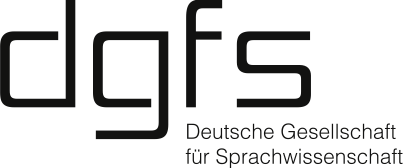AG 12 (Kurz-AG): The development of iconic gestures as resources in language acquisition
AG-Koordination
Friederike Kern & Katharina J. Rohlfing (U Bielefeld)
Abstract
The use of gestures as resources for the construction of verbal actions has been a topic of interest in language acquisition for some time. Since pointing gestures are dominantly present in young children as well as in interaction with them, most studies focus on this type of gestures. Several studies look at forms and functions of young children’s pointing gestures, and their connection with cognitive and linguistic abilities. Others show how older children may profit from a specific, taskadapted use of gestures [1], or, how caretakers adapt their gestures with regard to frequency and type to the developmental status of the child [2]. Relatively little known is about the use and development of early iconic gestures and their involvement in language acquisition. Iconic gestures are referred to as “representational” or “symbolic”, and can be used in reference to absent objects or events. An important finding relates to children’s later vocabulary development, which seems to benefit from earlier use of iconic gestures: Children who used iconic gestures earlier in their development, had richer vocabularies in their later development. However, only few studies show when and in what way (i.e. exhibiting what forms) iconic gestures emerge [3]. Furthermore, the different forms that iconic gestures might exhibit have barely been considered in developmental approaches. In addition, it is not clear whether different forms of iconic gestures are linked to different types of verbal actions systematically. Our panel will thus address the following research questions:
- Which aspects of objects are focused on, and how are they implemented in gestures (iconic mapping)?
- How are the gestures integrated into the grammatical surface (grammatical mapping)?
- How do different verbal actions affect the choice and use of iconic gestures (gestural mapping)?
- Does the physical foundation and thus bodily involvement of self-experienced events lay grounds for the acquisition and situated use of iconic gestures (embodied learning)?
Areas of interest: language acquisition, multimodal communication, pragmatics, semantics
References
- [1] Goldin-Meadow, S., Cook, S. W., & Mitchell, Z. A. Gesturing gives children new ideas about math. Psychological Science, 2009, 20(3), 267-272
- [2] Grimminger, A., Rohlfing, K. J. & Stenneken, P. (2010): Do mothers alter their pointing behavior in dependence of children’s lexical development and task-difficulty? Analysis of taskoriented gestural input towards typically developed children and Late Talkers. Gesture 10: 251-278.
- [3] Vogt, S. & Schreiber, S. (2006): Förderung von Gesten als Mitauslöser der lautsprachlichen Entwicklung. Theoretische und praktische Überlegungen für die logopädische Arbeit. L.O.G.O.S. Interdiziplinär 14: 179–185.
Programm
| 5.3.2015 | |||
| 9:00 | Erica Cartmill (UCLA) | ||
| The development of embodied iconicity: representational gesture over the first 5 years of life | |||
| 10:00 | Reyhan Furman, Paula Marentette & Elena Nicoladis (Alberta) | ||
| How do young children use iconic gestures in speech disambiguation? | |||
| 10:30 | Carina Lüke (Dortmund) | ||
| Iconic gestures support novel word learning in children with specific language impairment | |||
| 11:00 | Pause | ||
| 11:30 | Catherine Laing (York) | ||
| The iconic mapping of onomatopoeia in early word learning | |||
| 12:00 | Susanne Vogt1,2 & Christina Kauschke1(1Hochschule Fresenius,2Philipps Universität Marburg) | ||
| Iconic gesture as a resource for word learning in typically developing children and children with specific language impairment | |||
| 12:30 | General discussion | ||
| 6.3.2015 | |||
| 11:30 | Friederike Kern & Katharina Rohlfing (Bielefeld) | ||
| Contextual relations of iconic gestures | |||
| 12:00 | Vivien Heller & Katharina Rohlfing (Bielefeld) | ||
| Coming to grips with narrating: Depictive practices as a springboard into constructing fictional contexts | |||
| 12:30 | General Discussion |
Abweichung vom ursprünglichen Plan
Der Vortrag von Radlmaier & Lindner ist entfallen.

